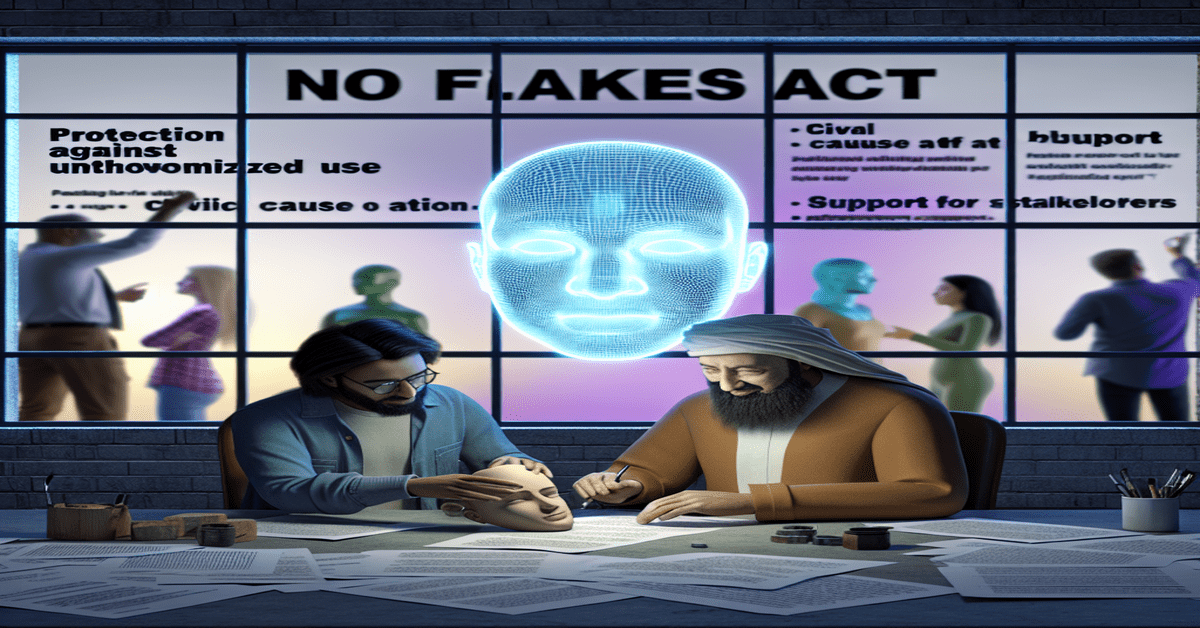Safeguarding Real Voices is more important than ever as artificial intelligence (AI) quickly advances. People are worried about their voices and images being used without permission, especially with the rise of deepfake technology. Deepfakes can create very realistic copies of someone without them knowing. To stop this, Senators Chris Coons, Marsha Blackburn, Amy Klobuchar, and Thom Tillis have introduced the NO FAKES Act. This bill is designed to protect people from having their voices and images used in AI-created replicas without their consent.
What is a Digital Replica?
The NO FAKES Act defines a digital replica as a highly realistic, computer-generated representation that is readily identifiable as an individual’s voice or visual likeness. These replicas can be created using advanced AI technologies, such as deep learning algorithms and neural networks. The bill recognizes that these digital replicas are a form of **property right** that belongs to the individual or their rights holders.
Exclusive Rights and Protection
Under the NO FAKES Act, individuals or their rights holders would have the exclusive right to authorize the use of their voice or likeness in digital replicas. This right would extend beyond the individual’s death and could be transferred or licensed. The bill seeks to hold individuals or companies liable for producing, hosting, or sharing unauthorized digital replicas, providing a strong deterrent against the misuse of AI-generated content.
Civil Cause of Action
The bill provides for civil actions against those who violate an individual’s rights, including injunctive relief, actual or statutory damages, punitive damages, and attorneys’ fees. This means that individuals whose Voices or likenesses have been used without their consent in digital replicas can take legal action to protect their rights and seek compensation for any harm caused.
Exceptions and Safeguarding Real Voices Harbors
To balance the protection of individual rights with the need for free speech and creative expression, the NO FAKES Act includes exceptions for certain uses of digital replicas. These exceptions cover areas such as news, public affairs, sports, documentaries, commentary, criticism, scholarship, satire, or parody. The bill also provides safe harbors for online services that remove unauthorized digital replicas upon receiving a notification from the rights holder.
Preemption of State Laws
One of the key aspects of the NO FAKES Act is its preemption of state laws related to the protection of voice and visual likeness rights in connection with digital replicas. This means that the bill would establish a nationwide harmonized right of publicity, providing clarity and consistency across jurisdictions. However, the bill does allow for certain existing state statutes or common law to remain in effect.
Industry Support
The NO FAKES Act has garnered support from various industry stakeholders, including SAG-AFTRA, the Recording Industry Association of America, the Motion Picture Association, OpenAI, IBM, and the Creative Artists Agency. These organizations recognize the importance of protecting artists and creators from the unauthorized use of their images and voices and see the bill as a step in the right direction.
The Future of AI and Digital Replicas
As AI technology continues to advance at a rapid pace, it is crucial that we have laws in place to protect individuals from the unauthorized use of their voices and visual likenesses. The NO FAKES Act represents a significant step forward in addressing the challenges posed by deepfake technology and ensuring that artists and creators have control over their digital identities.
However, it is important to note that the bill is still in its early stages and may undergo changes as it moves through the legislative process. It will be essential for lawmakers to strike a balance between protecting individual rights and fostering innovation in the AI industry.
Implications for the AI Industry
The introduction of the NO FAKES Act has significant implications for the AI industry. Companies developing AI technologies that generate digital replicas will need to ensure that they have obtained the necessary permissions and licenses from individuals or their rights holders. This may require additional due diligence and record-keeping to demonstrate compliance with the law.
Furthermore, the bill’s provisions for civil actions and damages may create additional risks for AI companies. It will be important for these companies to have robust policies and procedures in place to prevent the unauthorized use of individuals’ voices and visual likenesses, and to respond quickly to any notifications of infringement.
Conclusion
The NO FAKES Act represents a significant step forward in protecting individuals from the unauthorized use of their voices and visual likenesses in AI-generated digital replicas. By establishing a nationwide harmonized right of publicity and providing for civil actions against infringers, the bill seeks to empower artists and creators to control their digital identities.
As the AI industry continues to evolve, it will be important for lawmakers, industry stakeholders, and individuals to work together to ensure that the benefits of AI technology are realized while also protecting individual rights. The NO FAKES Act is an important contribution to this ongoing conversation, and its progress through the legislative process will be closely watched by those in the AI industry and beyond.
What are your thoughts on the NO FAKES Act? Do you believe it strikes the right balance between protecting individual rights and fostering innovation in the AI industry? Share your perspectives in the comments below and join the conversation on this important issue.
#NOFAKESACT #ArtificialIntelligence #DigitalReplicas #RightOfPublicity #DeepfakeTechnology #Real Voices #AI
- Original article and inspiration provided by Opahl Technologies
- Connect with one of our AI Strategists today at Opahl Technologies


